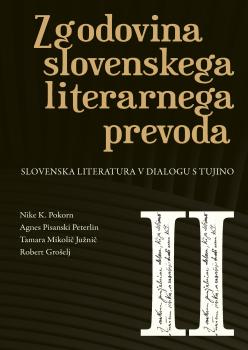Status literarnih prevajalcev in pogoji dela
Synopsis
The status of translators and interpreters has been marked by some turning points since 1991, as Slovenia’s independence brought a considerable increase in translation production, while the country’s accession to the European Union brought some more intensive collaborations with other countries. The studies presented here touch on the research on individual translators, either by translators themselves, discussing their own work, or by researchers observing the work of translators, as well as on broader research on literary translators and their status. The latter include general research on the literary translation market, based on responses to various questionnaires, as well as biographical and bibliographical research on Slovene literary translators, often based on interviews. The studies show that in recent decades the translation profession has become distinctly feminized, which has been, however, reflected in translation prizes with a considerable lag. Another important feature of the contemporary translation market is its precariousness, which has an impact on the way of working, the quality of life and other aspects of the lives of literary translators. Recent attempts to improve the status of translators include the White Paper on Translation.


